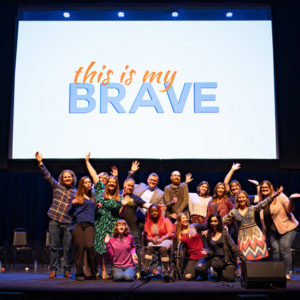Dating with a Mental Illness by TIMB Alum, Rebekah Bagley
So about a year ago, I downloaded Tinder looking for a relationship. Over the few months that I had Tinder, I “seriously talked” to about three men. Two of which I made detailed plans with, got excited about and…canceled last minute. I really liked these two men, and I ended up ghosting them. You see, I was CONVINCED that they were going to murder me. I had no basis for these thoughts, but I knew it.
The third Tinder match that I seriously talked to, I had a class with at my community college, and I knew he worked at my local Walmart. I talked to him for weeks and canceled a few meet-ups before I finally met up with him. But the decision to meet up with him wasn’t an easy one. I had to reason with myself with thoughts like, “Do serial killers work at Walmart? He was always quiet in the class we had together though…hmmm but he doesn’t dress like the sketchy murderers on “Criminal Minds” do, AND by the looks of it, I’m probably stronger than him.” Even though I had come to the conclusion that he MOST LIKELY wasn’t going to kill me, I still made sure to have an escape plan.
Through texting and hanging out I found out that this guy has mental illness, too! Of course it wasn’t the first “I know what you’re going through” that I had heard from a guy. I’ve dated guys who thought that the worst things could get is a little anxiety or feeling a little sad because their grandparent died. Plus, I had never truly opened up about what my mental illness was like for ME. And honestly, no guy I had ever dated or talked to had ever given enough of a shit to ask. So I was taken by surprise when this Tinder boy asked me what my diagnoses were, researched them on his own time, AND asked me for clarification and what parts pertained to me. Also through this “getting to know each other’s mental illnesses processes,” he never judged me. There aren’t many people out there that you can truly tell your messed-up thoughts to, especially without judgement.
I wish fifteen-year-old me would’ve known that there are people out there who will accept, support, and love you unconditionally. I wish someone would have told me that it’s okay to be 100 percent honest with the war going on in your mind. That when someone asks, “what are you thinking about?”, you tell them. That when the cute guy from bio is wearing a band shirt you like, you go up to them and talk to that boy. People are not nearly as judgmental as I always perceived them to be.
Cosmopolitan lists the best things to talk about on a first date. This lists things like your drug/alcohol use, your political affiliation, and your religion. But nowhere in this article does it say to talk about your mental illnesses. Dear Cosmo, if you think it’s appropriate to talk about your favorite drugs to a potential new partner, how about talking about the demons in your closet? You might not think that talking about your depression, anxiety, OCD, PTSD, Bi-polar disorder, or whatever label that’s been put on you, is socially accepted as “sexy”, but it’s a part of you. It’s just as big a part of you as your religious affiliation, if not more.
Actually, you know what? It IS sexy. If there can be countless articles about how “strong is sexy”, then you can learn to embrace it. What is stronger than looking death in the face every day and deciding to live? What’s stronger that learning to breathe with a demon’s hands around your throat? What’s stronger than having thousand-pound weights tied to your feet and walking every day? The strength of someone with mental illness is a strength much greater than anyone with physical strength, because there is no gym of the mind. Your mental strength comes from the raw desire to live, love, and be loved.
We as a society need to stop looking at our mental illness labels as a damaged tag. We are not damaged goods, we are so much more than what society has labeled us, and we deserve love.
My Name is Rebekah Bagley, I grew up in North Carolina and have struggled with Obsessive-Compulsive Disorder since the young age of five. After going through two hospitalizations and traveling down the road of recovery, I have become a mental health advocate. I proudly wear my semi-colon suicide awareness tattoo, talk to anyone I can about ending the stigma around mental health, and even had the honor of sharing my story in the Charlotte This Is My Brave show in November 2018.

